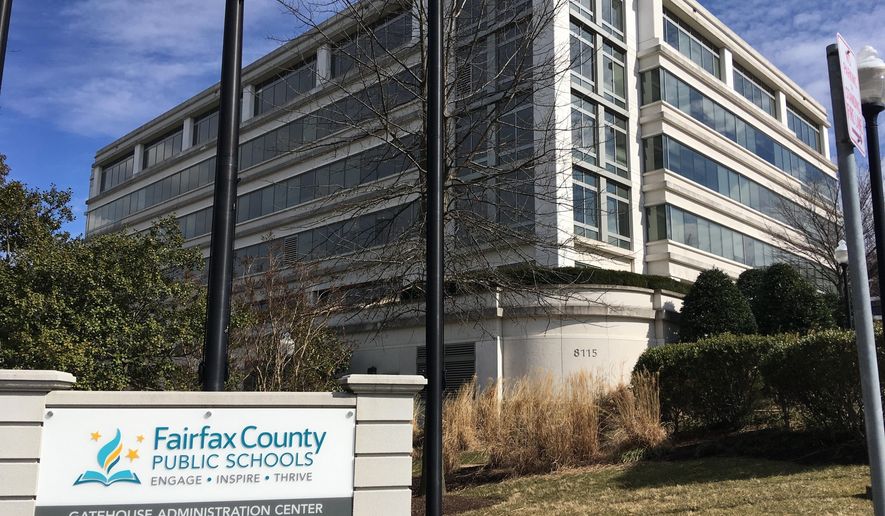A slide presentation this summer instructed social studies teachers in Fairfax County Public Schools that “critical race theory is a frame” for their work, even though officials in Virginia’s largest school system say the pedagogy is not a part of the curriculum.
The slide presentation, titled “Renew, Reflect, Re-imagine: Enacting a Critical Lens for Student Empowerment,” was presented via Zoom in August during an in-service day for K-12 social studies teachers in Fairfax County. The presentation is available on YouTube, and The Washington Times has received a digital copy of it.
In the 2-hour, 45-minute presentation, critical race theory is listed as one of the “community engagement and communications” tools teachers should understand in the upcoming school year. Alicia Hunter, the K-12 social studies coordinator for Fairfax County Public Schools, leads the discussion.
Ms. Hunter turns over the discussion to Lisa Williams, the school district’s chief equity officer, who explains that critical race theory is “an academic frame” to describe lessons the teachers will use for the 2021-2022 school year.
Ms. Williams acknowledged that this “may cause some consternation, with people asking ‘What is happening?’ and ‘Is this the right thing to do?’”
“Critical race theory as a frame is no less or more valuable than any other frame we might put on our work,” she said.
When asked Thursday about critical race theory in the curriculum, a school system spokeswoman said, “FCPS does not teach critical race theory.”
Since Friday, school officials have not responded to questions about the slide presentation, in which critical race theory is discussed for several minutes.
Like other school districts across the country, Fairfax County Public Schools is embroiled in heated discussions about critical race theory in public education.
A Marxist-based theory first developed in graduate schools, critical race theory posits that racism is a fundamental element of American government and life and calls for dismantling institutions to create an equitable society.
The pedagogy has become a point of contention in Virginia’s race for governor. Democratic nominee Terry McAuliffe has told voters that critical race theory is a right-wing bogeyman that is “not taught in Virginia; it’s never been taught in Virginia.”
The nonprofit group Parents Defending Education, however, released a database Friday showing that Fairfax County taxpayers have spent more than $5.5 million on contracts with critical race theorists and diversity, equity and inclusion specialists.
That total includes $20,000 to Boston University professor Ibram X. Kendi, one of the foremost proponents of critical race theory, for a one-hour virtual discussion in August 2020, and $49,600 on an “anti-bias community engagement policy” with the Leadership Academy, records show.
The biggest chunk of the money was a $2.44 million, five-year contract the school district signed last month with Panorama Education, which provides products infused with critical race theory. One of the company’s co-founders is a son-in-law of Attorney General Merrick Garland.
“From promoting ‘Woke Kindergarten’ to paying ideologue Ibram X. Kendi $20,000 for a one-hour virtual video talk, Fairfax County Public Schools has gone full-on woke for the divisive and destructive ideas of critical race theory,” said Asra Nomani, vice president of strategy and investigations for Parents Defending Education. “It is prioritizing indoctrination over education, and every taxpayer and parent should demand the school district return to the fundamentals of A, B, Cs — not W-O-K-E.”
Fairfax County Public Schools officials did not dispute the findings of the Parents Defending Education report. They did not respond to a request to reconcile their spending on critical race theorists and companies whose products are infused with critical race theory with their claims that it is not a part of the curriculum.
In the August slide presentation, Ms. Hunter makes clear that a focus will be “making sure we are representing all different identities that have been marginalized traditionally.”
The presentation unfolds with several slides that show the school district’s social studies emblem and the motto “Inquiry. Perspective. Action. Justice.” The school system did not respond to questions about how it defines “action” and “justice” as cornerstones of social studies education.
Ms. Williams explains how teachers’ work is “framed” by critical race theory, which she says is interchangeable with “multicultural,” “diversity” and “cultural competency.”
As Virginia’s largest school system, Fairfax County has nearly 12,500 teachers, more than 187,000 students and a $3 billion budget.
Virginia Mavens, a mother and taxpayer in Fairfax County, said she was disappointed that the school system spent so much money on a philosophy she believes will harm students’ development. She said the claim that critical race theory is not taught in the county’s schools is unpersuasive.
“They use terms like ‘equity’ to make it sound nice, but it doesn’t change what it really is,” Ms. Mavens said. “I think it’s very disappointing to find out your taxes are going to programs and curriculum that are teaching racism and hatred on people because of their skin color.”
Elizabeth Schultz, who served on the school board for eight years before losing in a 2019 sweep of liberal candidates, said Fairfax County voters made the choice.
“Fundamentally, they are not being honest,” said Ms. Schultz, who has tracked school policy and spending. “They use a word salad of buzzwords, but it’s de facto critical race theory in the curriculum and professional development. Of course there isn’t a class in high school called ‘critical race theory,’ but they are feeding it into every aspect of K-12 education. It’s being deeply embedded.”
Clarification: A Fairfax County mother and taxpayer who is a founder of a group named “Virginia Mavens” used the group’s name as a pseudonym for fear of online retaliation when she spoke to The Washington Times. The Times did not have prior knowledge of her pseudonym.
• James Varney can be reached at jvarney@washingtontimes.com.




Please read our comment policy before commenting.